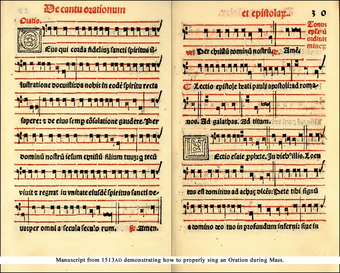
 F THE QUESTION asks for the capital of Tennessee, “Nashville” would be CORRECT, but if the question asks for Nebraska’s capital, “Nashville” would be INCORRECT. In other words, the question determines whether a particular answer is correct. Pretty obvious, right?
F THE QUESTION asks for the capital of Tennessee, “Nashville” would be CORRECT, but if the question asks for Nebraska’s capital, “Nashville” would be INCORRECT. In other words, the question determines whether a particular answer is correct. Pretty obvious, right?
Wrong. Many priests ask me, “Am I singing this Collect correctly?” Others ask, “Am I singing this Gospel correctly?” It depends on which tone they’re trying to sing.
Here are the texts 1 :
|
|
They’re supposed to be sung like this (pay special attention to the “Dominus Vobiscum” section):
* * PDF Download: “Simple Tone”
* * Mp3 Recording: “Simple Tone”
Yet many priests sing these prayers incorrectly. To understand how such a mistake is possible, one must realize that several tones can lawfully be chosen. Priests often mix the various tones unknowingly, which is not allowed. Even popular reference books get this wrong! For example, the CMAA’s Psallite Sapienter (2008) and Nicola Montani’s St. Gregory Hymnal (1920) give erroneous information about this tone. 2
If you don’t believe me, download the official rubrics from 1961. Or, you can consult the official rubrics from 1908, which reproduce my version exactly. 3 These same rubrics can also be found in the 1912 Antiphonale Romanum (Editio Vaticana). Their technical name is “Toni Communes” and I could easily include many more versions. 4

WITH REGARD TO the “erroneous version” sung by most priests, they confuse the “Simple Tone” (given above) with this one:
* * PDF Download: “Ferial Tone B” • This tone may also be used.
To discover the origin of “Ferial Tone B,” one must carefully examine Page 99 in the Liber Usualis. Even though these words have remained unchanged for 109 years, few people are aware of their existence.
In the famous 1941 Mass, 5 the priest correctly sings “Ferial Tone B,” but the choir sings the “Amen” incorrectly. For proof, you can watch the video excerpt, but you have to listen carefully because Msgr. Sheen speaks during some of it. The SSPX priest shown in this video excerpt from 2006 almost sings the tone correctly, but turns the “Oremus” upside down (and the congregation fails to sing “Et cum spiritu tuo” properly).
By the way, here is how the “Vidi Aquam” and “Asperges Me” appear in the St. Edmund Campion Hymnal, which is the only congregational hymnal for the Extraordinary Form.

NOTES FROM THIS ARTICLE:
1 The word Alleluia is added to several of these prayers during Eastertide, when the Vidi Aquam is sung.
2 Both books assume only one tone can be chosen, which is false. By the way, the St. Gregory Hymnal contains a surprising rubric about when the choir sings the Gradual.
3 The only difference is that I took advantage of the “descending fifth option” on the word «HABITACULO» which is specifically allowed by the 1961 rubrics for a Full Stop.
4 If you visit the Lalande Library, you’ll discover that most versions of the Kyriale contain the “Toni Communes.” The 1905 version from Styria is notable, since its font sizes are gargantuan. However, before the Vatican Edition appeared in 1905, there was great melodic variation. For example, the 1895 Liber Usualis of Abbot Pothier only includes one version of the Collect Tone, called the “Monastic Tone.” Notice, too, the interesting melodic variant chosen for the Pater Noster (people’s response) in that 1895 book.
5 A Traditional Latin Mass filmed in Our Lady of Sorrows Church (Chicago) and narrated by Msgr. Fulton J. Sheen.
